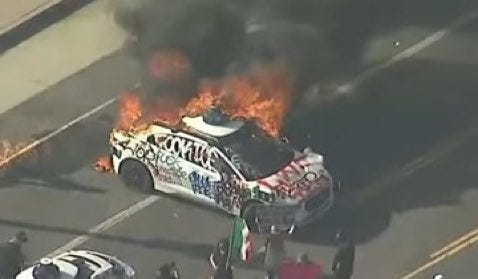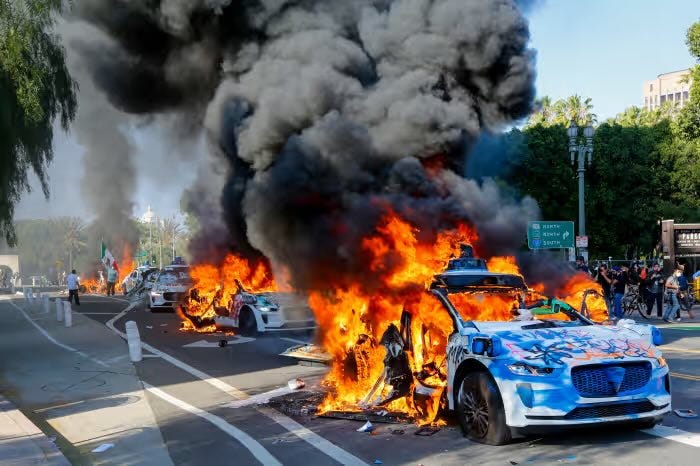I don’t mourn robot cars
Waymo has suspended service in Los Angeles after multiple instances of its autonomous cars being set on fire as protests and police violence rock the city. For those who are blissfully unaware, Waymo is a fully robotic car service, where you hail a ride as you would an Uber, but no person is present in the vehicle. They use full self-driving software to get you from place to place. And, over the past several days as rioters hailed the vehicles with the deliberate intention of setting them on fire, there was no human present to decide not to drive into the middle of a protest zone.
Waymo, you should know, is owned by Google. The cars of course require multiple cameras to function, and as Brian Merchant recently noted, “Waymos are roving surveillance machines.” People on the streets of LA know this, and feel it. The extent to which these robot cars are used to surveil us is remarkable, and makes them a perfect synopsis of our dystopia. Brian continues:
“404 Media has reported that the LAPD, as well as other police departments across the country, have obtained surveillance footage from Waymo vehicles and used it as evidence. Google, for its part, confirmed that it hands over this data upon request, usually, it says, through court order, warrant, or subpoena.”
It’s easy to see why protesters, who are there to fight state kidnappings, are opposed to surveillance bots roving their cities. It’s now common knowledge that Big Tech, from Google to Palantir, collaborates with ICE, and that many of their raids would be impossible without the software of tech oligarchs. Los Angeles might not quite be the belly of the beast that San Francisco and Silicon Valley are when it comes to this dystopia that fuses corporate America with the state, but it’s not too far. None of us are too far, now. The reach of these tools, of Big Tech and the government, has grown exponentially, and few of us are totally out of their range.
But that’s not how we’re supposed to think. America, home to millions of conservatives who once denounced government surveillance, now has a Republican Party that is deeply intertwined with Silicon Valley. Democrats are too, in many ways, but this Trump administration, its relationship with Elon Musk and Peter Thiel, and its eagerness to use the stick of the federal government against any opposition has seen a sea change overnight. There is now little daylight between the tech oligarchs and the fascist White House. Amazon, Google, Apple, Zuckerberg and the rest have all embraced the new regime, smiling up on the inauguration stage as they hope to profit handsomely from implementing authoritarianism.

So opposing the robots in our streets in increasingly treasonous, forbidden — what was once the common sense position that we should not be surveilled by corporations and our government is now radical. In this environment we’re expected to decry the burning of the inanimate vehicles. We’re expected to call the destruction of corporate property violent, while ignoring the kidnapping of thousands and thousands of our neighbors. We’re expected to think the robot cars feel more than the families being torn apart.
In short, we’re fed compliance and expected to swallow. We’re not expected to ask why Waymo exists, or why it should exist. We’re not expected to ask why it’s fine and acceptable for corporations to develop technologies with the sole purpose of replacing workers, but not okay when workers fight back. We’re not expected to ask why corporations get to surveil us at all times and feed that information to the police. We’re not expected to ask why our privacy can be sacrificed at the altar of corporate profits.
But people are starting to ask. As the neoliberal era reaches its twilight, the decades of propaganda are wearing off. Millions of people no longer think corporate profits get to grow and grow and grow forever as the quality of life most people enjoy no longer improves, as rents go up, as the healthcare system deteriorates. The default position that corporate profits and property are sacred is losing adherents, the violence inherent in replacing workers is being questioned, the idea that workers can be trampled to grow the company’s returns is being rejected.
And, right now, robot cars are taking the brunt of this loss of faith. Corporate property, once an inviolable holy site in the American geography, is rapidly coming to symbolize all that’s gone wrong. As Veena Dubal, law professor at UC Irvine, wrote the other day, “People are burning Waymos because they are vile representations of governance that has valued profit over the public good: they represent labor replacement, the decimation of public transport, & wild sci-fi fantasies being privileged over common sense.” Rarely is so much encapsulated in one object, but the robot car brings it all together. Google gets to replace workers, and we have no say. Silicon Valley gets to rearrange our world, and we have no say. The future moves away from our dreams and into a dystopian nightmare, and we have no say.
Martin Luther King Jr.’s famous line “A riot is the language of the unheard” is as relevant now as ever. The protests in LA, and the parts that broke out into riots, are the language of desperation. In the face of state kidnappings, people are doing the only thing they can think to do, flooding the streets in an effort to defend themselves and their communities. And while some people see robot cars on fire and resort to tropes about agitators and paid protesters, the truth is that the husks of Waymos are also the language of the unheard.
This world has gotten away from us. Capitalist development never wants to consult the working class, and as the power of the masses has waned the ruling class has bothered with us less and less. They don’t need to incorporate us into their decision making when men like Elon Musk can spend over $290 million on one election. They don’t need to consider us when they’ve purchased the political class, and gotten our government to spend endlessly on police and repressive violence. We’ve been left behind, and like so many moments of rebellion the torching of robot cars is, in many ways, an act of last resort.
The most famous example of people rising up to resist being replaced by machines is, of course, the Luddites. That term has become synonymous with resisting technological development, and in the general usage it’s somewhat derogatory. It connotes a simpleton who won’t adapt, won’t learn to use the latest technology. But it might not surprise you to learn that the Luddite uprising was a British worker rebellion. It was working people rising up against being undercut by machinery in the country’s clothing factories, primarily. The Luddites were the unheard masses, resisting the logic of capitalism, resisting the idea that bosses have some unalienable right to replace them with the latest technology.
According to Brian Merchant (the writer mentioned at the top of this piece who has a great book on the Luddites called Blood in the Machine), the predecessors to the Luddites tried every available option, for years, before they smashed up some machines. They tried to negotiate with their bosses, they tried petitioning the government, they tried worker organizing. All of it was rejected. Only then did they resort to the smashing up of machines that they came to be known for.
Would you mourn the destruction of the sewing machines that replaced human workers? Would you mourn the factory windows that got busted up? Do you mourn the robot cars burnt on the streets of LA? I don’t mourn the machines. I mourn for the kidnapped, and their families. I mourn for the jobs lost to robots, and for the lives that have gotten tangibly worse so that a billionaire can buy his third house. I mourn the loss of the future we could be living in, the future where everyone has what they need and where technology is used to help us rather than attack and replace us. I mourn the loss of what could be. - JP




Public transportation trams & light rail > Waymo
Thank you, spot on.